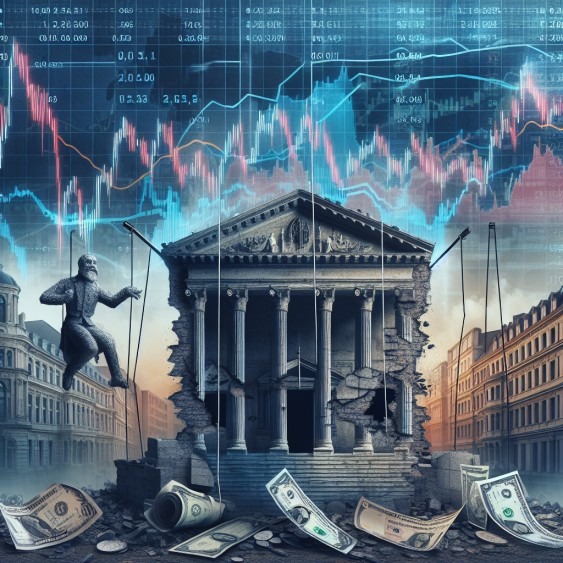
What Is The Best Way For One To Recover After a Financial Disaster? A Strategic Guide
May 12, 2024
Introduction: Navigating Turbulent Waters
Like stormy seas, financial markets often present investors with chaotic and unpredictable scenarios. The potential for significant losses and remarkable recoveries exists within these turbulent waters. This essay delves into the concept of financial disaster recovery, exploring ancient wisdom and modern strategies to provide a comprehensive roadmap for investors seeking to navigate market crashes and emerge victorious. Through a blend of philosophical insights and practical techniques, we will uncover the path to turning financial disasters into opportunities for growth and profit.
Ancient Wisdom for Modern Challenges: Lessons from the Past
“Wealth is not an end, but a means to an end.” — Aristotle.
Aristotle’s profound insight highlights a fundamental perspective for investors. He suggests wealth is a tool to achieve a higher purpose. This ancient Greek philosophy emphasizes the importance of moderation and prudence in financial matters, known as “sophrosyne.” By recognizing wealth as a vehicle for achieving our goals, we can approach financial disasters as opportunities to reshape our economic destiny.
As Socrates taught, the ancient Greeks also valued self-knowledge and understanding one’s limits. This wisdom is crucial for investors, as it encourages the development of robust and disciplined financial strategies that can weather any storm. The renowned Chinese philosopher Confucius offered a similar perspective, underscoring the importance of ethical practices and long-term sustainability in wealth accumulation.
Understanding Market Dynamics: Riding the Waves of Change
Financial markets are akin to the ocean’s tides, constantly fluctuating between growth and decline. Corrections, or short-term price drops, serve as natural resets, shaking off excessive speculation and paving the way for sustainable development. However, market crashes and financial disasters signify more severe downturns, often triggered by economic imbalances or external shocks.
The great economist John Maynard Keynes likened the stock market to a beauty contest, emphasizing the psychological and crowd dynamics. Fear and panic can grip the market during a financial disaster, leading to a self-reinforcing downward spiral. Yet, within this chaos, opportunities arise for those brave enough to seize them.
Navigating the Storm: Strategic Approaches for Recovery
When faced with a financial disaster, investors need a tactical arsenal to recover losses and profit from market turmoil. Here are some critical strategies:
– Contrarian Investing: Evoking Sun Tzu’s wisdom from “The Art of War,” investors should seek out undervalued assets that others neglect during times of fear.
– Value Investing: Following Benjamin Graham’s philosophy, focus on investing in solid companies with strong fundamentals that may be temporarily undervalued due to market sentiment.
– Technical Analysis: Utilize chart patterns and indicators to time entries and exits effectively.
– Diversification and Risk Management: Allocate capital across various asset classes, sectors, and regions to reduce exposure to specific risks.
– Embrace Volatility: Employ options trading and mean-reversion strategies or invest in volatility-focused funds to capitalize on market fluctuations.
Learning from History: A Treasure Trove of Insights
History serves as a valuable teacher, offering lessons from past financial disasters. From the Great Depression to the Global Financial Crisis of 2008, each event has unique characteristics while sharing common themes: excessive risk-taking, market euphoria, and underlying vulnerabilities. By studying these events, investors can identify warning signs and develop resilient strategies.
Cicero, the ancient Roman statesman, cautioned against financial excess, emphasizing the importance of a balanced budget and fiscal responsibility. His words echo across the centuries, reminding investors of the dangers of imprudence and the need for a proactive approach to disaster recovery.
The Power of Patience: A Long-Term Perspective
“The key is to keep company only with people who uplift you, whose presence calls forth your best.” — Epictetus
Epictetus’s wisdom encourages investors to adopt a long-term perspective and maintain discipline during challenging times. Financial disasters can test resolve, but recovery becomes achievable by staying true to a well-thought-out investment strategy and trusting in the potential of carefully chosen assets.
The Shine of Precious Metals: A Safe Haven in Turbulent Times
Precious metals, particularly gold, have traditionally served as a safe haven during financial disasters. Gold’s intrinsic value, limited supply, and role as a reliable store of wealth make it a hedge against inflation and market turmoil. As paper currencies fluctuate, gold and silver provide stability and a foundation for portfolios.
Planning for the Storm: A Proactive Approach
Financial disasters are inevitable, and investors must be proactive:
– Build emergency funds for liquidity and to avoid forced selling during crises.
– Diversify across asset classes, sectors, and regions to reduce risk exposure.
– Employ risk management techniques like stop-loss orders to limit potential losses.
– Stay informed, adapt to market changes, and embrace volatility as an opportunity.
Conclusion: Turning Chaos into Triumph
Financial disasters, though unavoidable, present unique opportunities for those with a strategic mindset. By blending ancient wisdom with modern financial expertise, investors can navigate market crashes and emerge victorious. From Aristotle to Lao Tzu, old philosophers remind us that change is constant, and it is through discipline, long-term thinking, and the recognition of opportunities within chaos that actual financial growth and prosperity can be achieved.
As Heraclitus wisely stated, “The only constant in life is change,” and it is through our ability to adapt to the cyclical nature of financial markets that we will recover from economic disasters and turn them into catalysts for progress and success.
The quotes from Lorraine Walter’s “The Coming Battle” underscore the critical concerns about financial power and the need for vigilance. As investors, we must navigate the complexities of the economic landscape with a keen eye, embracing volatility and market shifts to emerge resilient and prosperous.
Engaging Articles to Enrich Your Mind
Financial Disaster Recovery Plan: Buying the Crash, Selling the Joy
FAQ: What Is The Best Way For One To Recover After a Financial Disaster?
What is the best way for one to recover after a financial disaster through diversification?
– Diversifying your investment portfolio across various asset classes, sectors, and regions is crucial. This strategy reduces the impact of any single market downturn and helps stabilize your financial standing by spreading risk.
How can contrarian investing help one recover after a financial disaster?
– Contrarian investing involves buying undervalued assets that others sell during a financial crisis. This approach can be beneficial as it allows investors to purchase quality assets at lower prices, setting the stage for potential gains when the market recovers.
FAQ: What role does patience play in recovering from a financial disaster?
– Patience is vital in weathering financial storms and recovering from disasters. Maintaining a long-term perspective helps investors avoid panic selling and ensures they can hold onto quality investments until their value is fully realized as markets stabilize.













I most appreciate articles that have dates on attached to them.